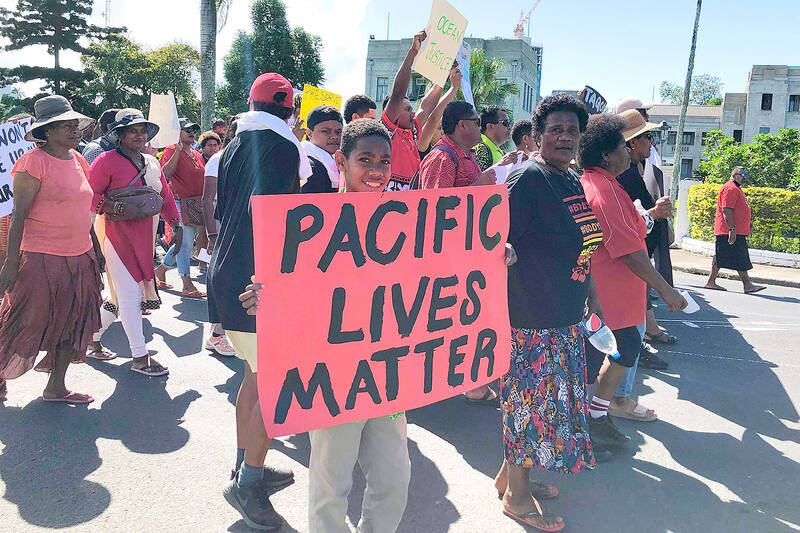China’s Pacific allies from the Solomon Islands’ government to Fiji’s opposition yesterday echoed Beijing’s criticism of Japan releasing wastewater from its disaster-hit Fukushima Dai-ichi nuclear plant.
Treated wastewater is to be released into the Pacific Ocean over decades in a plan endorsed by the International Atomic Energy Agency (IAEA), but China has issued a furious response, and its allies in the Pacific have backed that criticism despite safety assurances from Japan and the IAEA.
Solomon Islands Prime Minister Manasseh Sogavare — who has delayed elections and scolded Western powers while embracing Beijing’s checkbook diplomacy — issued a “strong statement against Japan’s decision.”

Photo: AFP
The water release “has an impact on our people, ocean, economy and livelihood,” Sogavare said.
There was a similar message in the Fijian capital, Suva, where a rare protest attracted hundreds.
Demonstrators carried placards saying “Nuclear-free sea” and “Pacific Lives Matter.”
The protest was promoted by FijiFirst, an opposition party whose leader, former Fijian prime minister Voreqe Bainimarama, courted closer ties with China while in office.
The party accused Fiji’s government of “failing future generations by allowing Japan to dump its nuclear waste into our ocean.”
Other leaders in the region appeared to be convinced by the safety assessments.
“Japan has reassured the region that the water has been treated,” said Cook Islands Prime Minister Mark Brown, who is chair of the Pacific Islands Forum, a regional bloc. “I believe that the discharge meets international safety standards.”
China has repeatedly and strongly criticized the release plan, banned Japanese seafood imports and cast doubt on the expert assessments that concluded the operation poses no harm to the environment.
Nigel Marks, a physics professor at Australia’s Curtin University, said the released water contains negligible amounts of radioactive tritium.
“The Pacific Ocean contains 8,400 grams of pure tritium, while Japan will release 0.06 grams of tritium every year,” Marks said. “The minuscule amount of extra radiation won’t make the tiniest jot of difference.”
Regardless of the data, the Fukushima release has created a political opening for Beijing, said Mihai Sora, a former Australian diplomat who is now with the Lowy Institute in Sydney.
Japan has “done a lot of diplomacy to win over as many Pacific leaders as they can,” but “almost universally this will be an unpopular decision among Pacific communities,” Sora said.
“You can imagine Beijing using its diplomatic access to encourage some of its partners to speak out about this strongly, because it serves Beijing’s interests,” he said.
As well as fears about damaging vital fish supplies and sensitive marine ecosystems, the Fukushima water release has caused disquiet in a region where nuclear issues are highly sensitive.
For decades, major powers including the US, Britain and France used the sparsely populated South Pacific to test atomic weapons — with consequences that linger to this day.
Meanwhile, samples of seawater taken following the release showed radioactivity levels well within safe limits, data provided yesterday by operator Tokyo Electric Power Co showed (TEPCO).
“We confirmed that the analyzed value is equal to the calculated concentration and that the analyzed value is below 1,500” becquerels per liter, TEPCO spokesman Keisuke Matsuo said a day after the release began.
The national safety standard is 60,000 becquerels per liter.

Malaysia yesterday installed a motorcycle-riding billionaire sultan as its new king in lavish ceremonies for a post seen as a ballast in times of political crises. The coronation ceremony for Malaysia’s King Sultan Ibrahim, 65, at the National Palace in Kuala Lumpur followed his oath-taking in January as the country’s 17th monarch. Malaysia is a constitutional monarchy, with a unique arrangement that sees the throne change hands every five years between the rulers of nine Malaysian states headed by centuries-old Islamic royalty. While chiefly ceremonial, the position of king has in the past few years played an increasingly important role. Royal intervention was

X-37B COMPARISON: China’s spaceplane is most likely testing technology, much like US’ vehicle, said Victoria Samson, an official at the Secure World Foundation China’s shadowy, uncrewed reusable spacecraft, which launches atop a rocket booster and lands at a secretive military airfield, is most likely testing technology, but could also be used for manipulating or retrieving satellites, experts said. The spacecraft, on its third mission, was last month observed releasing an object, moving several kilometers away and then maneuvering back to within a few hundred meters of it. “It’s obvious that it has a military application, including, for example, closely inspecting objects of the enemy or disabling them, but it also has non-military applications,” said Marco Langbroek, a lecturer in optical space situational awareness at Delft

The Philippine Air Force must ramp up pilot training if it is to buy 20 or more multirole fighter jets as it modernizes and expands joint operations with its navy, a commander said yesterday. A day earlier US National Security Adviser Jake Sullivan said that the US “will do what is necessary” to see that the Philippines is able to resupply a ship on the Second Thomas Shoal (Renai Shoal, 仁愛暗沙) that Manila uses to reinforce its claims to the atoll. Sullivan said the US would prefer that the Philippines conducts the resupplies of the small crew on the warship Sierra Madre,

AIRLINES RECOVERING: Two-thirds of the flights canceled on Saturday due to the faulty CrowdStrike update that hit 8.5 million devices worldwide occurred in the US As the world continues to recover from massive business and travel disruptions caused by a faulty software update from cybersecurity firm CrowdStrike, malicious actors are trying to exploit the situation for their own gain. Government cybersecurity agencies across the globe and CrowdStrike CEO George Kurtz are warning businesses and individuals around the world about new phishing schemes that involve malicious actors posing as CrowdStrike employees or other tech specialists offering to assist those recovering from the outage. “We know that adversaries and bad actors will try to exploit events like this,” Kurtz said in a statement. “I encourage everyone to remain vigilant